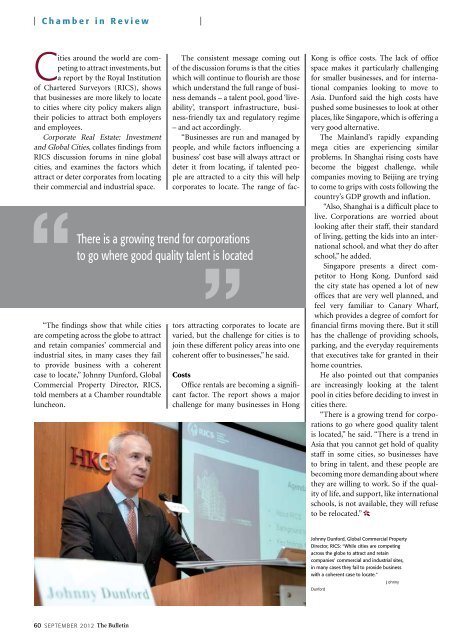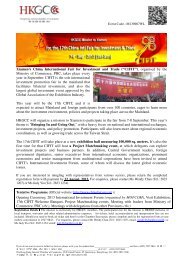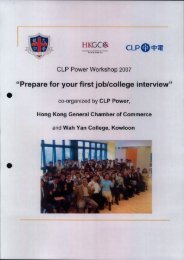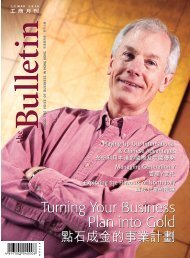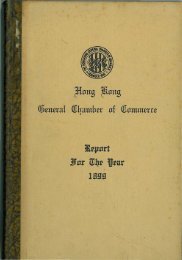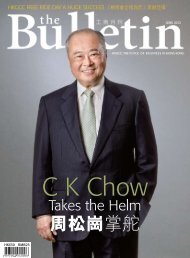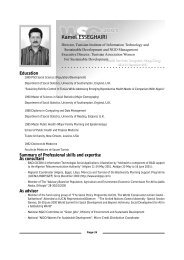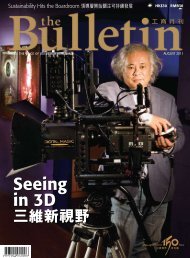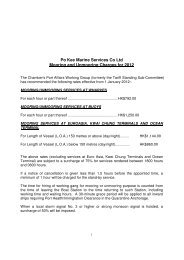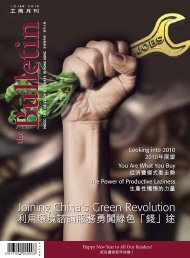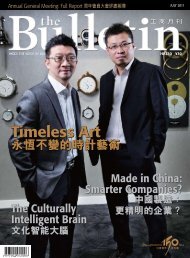æ¥é·è¯å°è¨ª - The Hong Kong General Chamber of Commerce
æ¥é·è¯å°è¨ª - The Hong Kong General Chamber of Commerce
æ¥é·è¯å°è¨ª - The Hong Kong General Chamber of Commerce
Create successful ePaper yourself
Turn your PDF publications into a flip-book with our unique Google optimized e-Paper software.
| <strong>Chamber</strong> in Review 活 動 重 溫 |Cities around the world are competingto attract investments, buta report by the Royal Institution<strong>of</strong> Chartered Surveyors (RICS), showsthat businesses are more likely to locateto cities where city policy makers aligntheir policies to attract both employersand employees.Corporate Real Estate: Investmentand Global Cities, collates findings fromRICS discussion forums in nine globalcities, and examines the factors whichattract or deter corporates from locatingtheir commercial and industrial space.“<strong>The</strong> findings show that while citiesare competing across the globe to attractand retain companies’ commercial andindustrial sites, in many cases they failto provide business with a coherentcase to locate,” Johnny Dunford, GlobalCommercial Property Director, RICS,told members at a <strong>Chamber</strong> roundtableluncheon.<strong>The</strong>re is a growing trend for corporationsto go where good quality talent is located企 業 日 漸 傾 向 遷 移 到 擁 有 優 質 人 才 的 地 方<strong>The</strong> consistent message coming out<strong>of</strong> the discussion forums is that the citieswhich will continue to flourish are thosewhich understand the full range <strong>of</strong> businessdemands – a talent pool, good ‘liveability’,transport infrastructure, business-friendlytax and regulatory regime– and act accordingly.“Businesses are run and managed bypeople, and while factors influencing abusiness’ cost base will always attract ordeter it from locating, if talented peopleare attracted to a city this will helpcorporates to locate. <strong>The</strong> range <strong>of</strong> factorsattracting corporates to locate arevaried, but the challenge for cities is tojoin these different policy areas into onecoherent <strong>of</strong>fer to businesses,” he said.CostsOffice rentals are becoming a significantfactor. <strong>The</strong> report shows a majorchallenge for many businesses in <strong>Hong</strong><strong>Kong</strong> is <strong>of</strong>fice costs. <strong>The</strong> lack <strong>of</strong> <strong>of</strong>ficespace makes it particularly challengingfor smaller businesses, and for internationalcompanies looking to move toAsia. Dunford said the high costs havepushed some businesses to look at otherplaces, like Singapore, which is <strong>of</strong>fering avery good alternative.<strong>The</strong> Mainland’s rapidly expandingmega cities are experiencing similarproblems. In Shanghai rising costs havebecome the biggest challenge, whilecompanies moving to Beijing are tryingto come to grips with costs following thecountry’s GDP growth and inflation.“Also, Shanghai is a difficult place tolive. Corporations are worried aboutlooking after their staff, their standard<strong>of</strong> living, getting the kids into an internationalschool, and what they do afterschool,” he added.Singapore presents a direct competitorto <strong>Hong</strong> <strong>Kong</strong>. Dunford saidthe city state has opened a lot <strong>of</strong> new<strong>of</strong>fices that are very well planned, andfeel very familiar to Canary Wharf,which provides a degree <strong>of</strong> comfort forfinancial firms moving there. But it stillhas the challenge <strong>of</strong> providing schools,parking, and the everyday requirementsthat executives take for granted in theirhome countries.He also pointed out that companiesare increasingly looking at the talentpool in cities before deciding to invest incities there.“<strong>The</strong>re is a growing trend for corporationsto go where good quality talentis located,” he said. “<strong>The</strong>re is a trend inAsia that you cannot get hold <strong>of</strong> qualitystaff in some cities, so businesses haveto bring in talent, and these people arebecoming more demanding about wherethey are willing to work. So if the quality<strong>of</strong> life, and support, like internationalschools, is not available, they will refuseto be relocated.”Johnny Dunford, Global Commercial PropertyDirector, RICS: “While cities are competingacross the globe to attract and retaincompanies’ commercial and industrial sites,in many cases they fail to provide businesswith a coherent case to locate.”英 國 皇 家 特 許 測 量 師 學 會 全 球 商 業 地 產 總 監 JohnnyDunford 說 :「 儘 管 各 地 城 市 都 爭 相 吸 納 和 保 留 企 業 以當 地 作 為 工 商 業 選 址 , 但 它 們 往 往 未 能 提 供 一 致 的 理由 , 說 服 企 業 在 當 地 落 戶 。」60 September 2012 <strong>The</strong> Bulletin 工 商 月 刊


